

 |
 |
||||
| Home | Reviews | Extras | Forums |
|
KakushigotoSynopsisKakushi Gotou is a mangaka famous for his perverted comdy manga series "Balls of Fury" and "Tights in the Wind". He tries to keep his being a mangaka a secret from his 11 year-old daughter Hime, with the help of his assorted colorful assistants and editor. There is also an ongoing subplot that takes place seven years later, where an 18 year-old Hime returns back to her childhood home and finally learns of her father's secret mangaka job. But where IS her father...? ReviewTim: From the mind of the same name behind Sayonara Zetsubou Sensei, Kakushigoto takes a different approach to Kouji Kumeta's earlier work with one major difference; it is a lot less pessimistic overall of its world view. (Both shows do share the same actor, Hiroshi Kamiya, voicing its lead, though. Heh.) While it's not a world of rainbows and sunshine either, Kakushigoto is definitely the more apporachable of the two shows, though it does retain a bit of the series' snark and writing still, which I'll discuss later in the review. Stig: I have never seen Sayonara Zetsubou Sensei myself, partially because its reputation for being rather... acerbic... preceeded it by quite a solid margin, and I'm normally not one to watch deeply cynical shows or movies. While the main topic sounded kind of endearing, and certainly reminiscent of a certain other show I reviewed some years back, I was still a bit worried going into this, even if for a different reason than said certain other show. It's also worth mentioning that I realized going in that Kakushigoto is a show of many, MANY word jokes, most of which were going to fly right over my head. 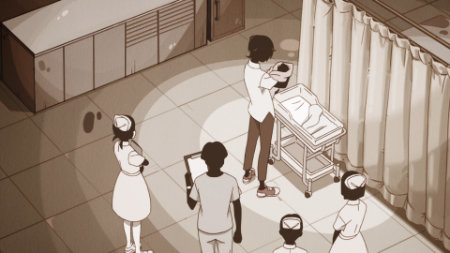 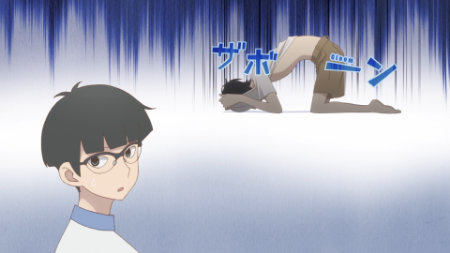 At its heart, Kakushigoto is a story about relationships, whether between a father and his daughter, the same father and his edtiorial staff, or his daughter and her own group of friends. The main characters, of course, are Kakushi and his daughter Hime, and the tribulations and turns that come from a father raising his 11 year-old daughter on his own. This isn't really anything new anymore, as there has been a curious upswing in father/daughter shows, or a show that follows that particular dynamic. Bunny Drop is probably the more famous (or infamous, if you bring the manga into this), but there has also been the little delight that is Sweetness and Lightning, wherein our two protagonists are biologically related. Which is not to say that we think an adopted family is in any way less legitimate from a familial standpoint, but aside from the aforementioned Bunny Drop, we can at least name one other show that sets up a pairing starting out as father/daughter and then taking it in a different and vastly more uncomfortable direction. Tim: Similar to my own feelings on Miss Kobayashi's Dragon Maid, I feel that Kakushigoto is at its best and sweetest when it's about Kakushi and Hime. Kakushi really goes through hell and back for his daughter, whether it's taking classes to cook, taking her places, or adopting a dog. Hime does come a bit like an airhead, but she's certainly not dumb, and her denseness does get a few laughs from me at times. The scenes with her and her own group of friends aren't common, but they are cute and show they really care about her like she does them. It's a nice character balance. Stig: Granted, while I can understand why Kakushi doesn't want to explain what kind of manga he's creating to his daughter, at least not until she becomes an adult, it's also worth mentioning that most of his efforts are a result from his many neurotic hangups. To say the guy is a bit eccentric would be a rather significant understatement, and I can only wonder what initially drew her mother to him in a way that later resulted in a girl like Hime to be born. But yeah, Hime seems a bit detached from the world in a rather odd way, albeit not necessarily in an unrealistic way for children her age. Still, she seems awfully well-behaved and almost notoriously accepting of everything going on around her in a world that turns into a stalk-a-ton between people whose hobby seems to be jumping to the most ridiculous conclusion their minds could come up with. And when we mentioned earlier that Kakushi goes out of his way to keep his secret of being a mangaka from Hime, he really, truly does. He gets changed into a business suit on his way home at a local costume store, gets his editiorial staff to dress up in the rare chance Hime could appear, and even purposely downgrades his art at home to not throw Hime off of his career. And that's not even going into the times when he has to balance between being on a mangaka meet-and-greet and taking Hime on some school-related event, turning the whole thing into a Mrs. Doubtfire back-and-forth, but without the need for crossdressing. You could probably argue this is at least part of the reason why Kakushi is a neurotic wreck half the time. Being a series revolved around making a manga, Kakushigoto of course has its fare share of talking about the industry, whether it be truths, jokes, or just flat-out references to actual companies and mangaka. And this is where the writing style of Sayonara Zetsubou Sensei comes up again that was mentioned earlier. It's not uncommon for the show to go on two to three minute tangents about various topics before switching back to another joke or punchline. Examples of topics include love/hate relationship between mangaka and their editors, how to compromise on art to get the job done, and even how manga creators become downright fearless about trying out new things when they think their manga is about to be cancelled. If this style of writing and dialogue annoyed you in Sayanoara Zetsubou Sensei, it'll likely do the same to you here, too. It's very much a "love it or hate it" writing style. And while most of the cast of Kakushigoto are decent enough folk (if not susceptable to their own vices and wants; they are only human after all), there's always of course in comedy anime that ONE character. You know, the one character the show would be 100 times better off if the cast tied them to a cliff with cement shoes and left them to drown with the fishes. In Kakushigoto's case, this would be the title character's editor Satsuki Tomaruin (always referred to by his last name). He's rude, insensitive, selfish, demanding, pushy, creepy (he has a crush on the Indonesian babysitter who looks after Hime, which includes stalking her outside Kakushi's house), and forces stupid editorial decisions on Kakushi just to piss him off. He's also a massive Karma Houdini on top of all of this, nearly more than once spilling Kakushi's mangaka job to his daughter Hime, usually on purpose. (Just in case you need more reason to hate him.) It's hard to tell whether Kumeta meant for the character to be as gargantuan a jackass as he is due to his own annoyance with his own editors, but Tomaruin does a lot of things that range from irritating to downright reprehensible, which makes him a hard character to like, even in a show as dependant on people's blunt directness as this one. It takes until the 18 year-old Hime arc for him to just be tolerable. 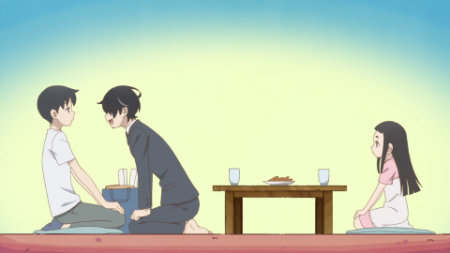 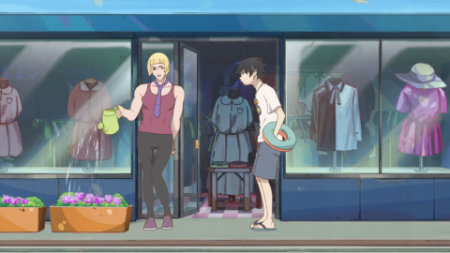 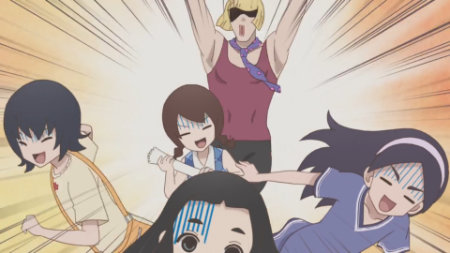 Like Sayonara Zetsubou Sensei before it, Kakushigoto is very much a talking heads show as well, though not quite to the extreme. Animation studio Ajiado does a good job showcasing a warm, lively color palette and striking lines, so the series never comes across looking cheap. And some of the background art can get pretty damn gorgeous as well, especially in the show's ending theme animation. Speaking of the ending, we might as well talk about Kakushigoto's secondary storyline that runs concurrent with the main one. At the end of every episode (and the start of the first one), a now 18 year-old Hime slowly pieces together what happened to her father in the seven years between the "past" stories and the present. This is drippled down episode by episode, where we have to verrrry slowly watch the series piece together what happened to its characters in the intervening years. (It also shows us Hime is still best friends with her elementary school friends, which made me go aww. -Tim) It's not until the final episode, that takes place entirely in the present time, that we learn what happened to everyone. We won't spoil anything, but the revelation is one part sad and one part hopeful. When Kakushigoto shines, it truly shines. Kakushi and Hime's father-daughter relationship is a rare one in comedy anime, one without resorting to the "hur hur Dad is dumb" jokes that more than annoy us (though moreso Tim) with father archetypes in North American cartoons these days, rather than single-fatherhood being a journey of learning as is the case in shows like Bunny Drop and Sweetness and Lightning. The voice acting is spot-on, with nary a mismatched voice among the cast, which is impressive enough, given how some of the characters can shift moods on a dime. And like mentioned before, the show can be damn gorgeous when it wants to be. Little moments like Hime getting a dog or going to a festival get us more than the typical routines in "cute girls do stuff" shows nowadays do. 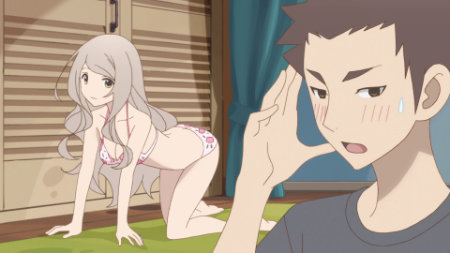 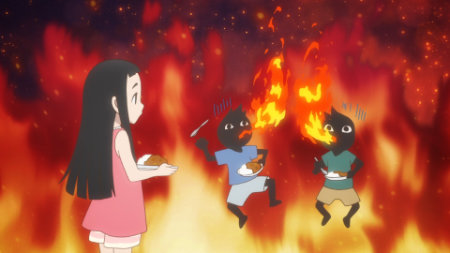 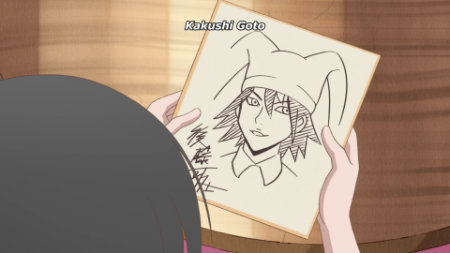 Tim: So yeah, I really dug Kakushigoto. It's by no means perfect, and Tomaruin is an unfunny creep, but the good stuff more than outweights the bad. I highly recommend it. Stig: I don't think this show is going to make me want to watch Sayonara Zetsubou Sensei, given that even the ANN writers label Kakushigoto as "Kouji Kumeta growing up and mellowing out", but that is also why I really liked the latter despite its many, many panic attacks. Yes, the relationship between Kakushi and Hime is endearing as all hell, and yes, the show is also an interesting piece of insight in the manga industry, warts and all. But behind all the jadedness, the eccentricism, the panic attacks, the skullduggery and the editor, there lies a show with a heart of gold. It can get dumb at times, and not every joke lands, but overall Kakushigoto is just too darn cute/good to rate a lowly three star to. Remove a star if you're not fond of Kumeta's style of writing, since it's everywhere here. — Stig Høgset and Tim Jones Recommended Audience: There isn't really much in the way of violence outside of slapstick, and if there was any fanservice in the show, we couldn't really recall anything worth mentioning. Of course, the thematics of the show are pure adult shenanigans and mysticisms, so it's not as much that the show is inappropriate for kids or teenagers rather than being made for adults who have lived at least part of those lives. Version(s) Viewed: FUNimation stream (Tim) and Wakanime stream (Stig), Japanese with English subtitles Review Status: Full (12/12) Kakushigoto © 2020 Koji Kumeta / Kodansha / Kakushigoto Production Committee |
 |
|
| © 1996-2015 THEM Anime Reviews. All rights reserved. |